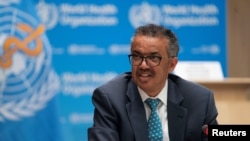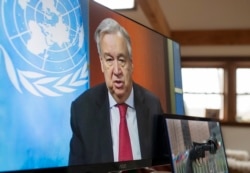A record number of new coronavirus infections worldwide was confirmed Wednesday. The World Health Organization (WHO) said more than 106,000 new COVID-19 cases were identified globally within 24 hours, the highest daily number since the outbreak began.
WHO Director-General Tedros Adhanom Ghebreyesus said in a news briefing Wednesday that almost two-thirds of the new cases were confirmed in just four countries. He did not name them, but several news reports name the four countries as the United States, Russia, Brazil and India.
Brazil had a record number of new cases Wednesday since the outbreak began there: close to 20,000 in one day. India had more than 5,600 new cases. Russia has had between 9,000 and 10,000 new cases daily for the past two weeks. The United States had about 45,000 new cases reported Tuesday.
Close to 5 million people worldwide have been infected with the novel coronavirus, and the death toll is approaching 325,000. The United States has the most cases, about 1.5 million, and the highest death toll, more than 93,200.
Tedros said the organization is especially concerned about the rising numbers of cases in low-and middle-income countries. He stressed the importance of keeping supply chains open and ensuring that medical supplies reach health workers and patients.
U.N. Secretary-General Antonio Guterres warned that millions of people could be pushed into extreme poverty in Africa if the coronavirus spreads at a faster rate. He noted that the pandemic is still in early stages on the continent.
The Africa Centers for Disease Control and Prevention said COVID-19 has killed more than 2,800 people. The largest numbers of confirmed cases on the continent are in South Africa, Egypt, Algeria, Morocco and Nigeria.
Guterres commended African leaders for responding swiftly to the outbreaks by enacting restrictions, including border closures and quarantines, but noted that an escalation could quickly overwhelm the countries’ health systems and diminish their food supply. The U.N. chief called for global solidarity with Africa as an essential part of ending the global coronavirus pandemic.
The epicenter of the coronavirus outbreak seems to have moved away from Europe, where countries are beginning to open businesses, parks, some schools and even bars and restaurants, but with new regulations to help prevent a resurgence of COVID-19. A mandatory mask order goes into effect Thursday in Spain for those over the age of 6 who are in a public place where it is not possible to stay two meters away from others.
Italy reported Wednesday that its number of new cases fell from 813 to 665 Wednesday. Slovenia declared itself completely free of the virus. The Netherlands will further ease restrictions June 1.
Sweden, which has eschewed tough measures such as school and business closures, also is reporting a decline of new cases. But a new study showed that the strategy promoted by the country’s chief epidemiologist, Anders Tegnell, did not lead to the so-called herd immunity, as was hoped. Scientists have found that only 7.3% of the people developed antibodies to fight the virus. Sweden has had a significantly higher rate of infections and deaths from the coronavirus than other Scandinavian countries, but much lower than Britain, Italy, France and Spain.
As the pandemic weakens in Europe, the virus is spreading in South America, notably in Brazil and Peru. Venezuela is also trying to contain an uptick in cases along its border with Brazil and Colombia. Authorities said there were 131 new cases over the course of 24 hours and linked the increase to migrants returning home.
In China, where the outbreak began in December, officials in the northeastern province of Jilin are trying to contain a new cluster of cases.
Japan is not out of the woods yet. Organizers of Japan’s popular summer high school baseball tournament were forced to cancel this year for the first time since World War Two.








